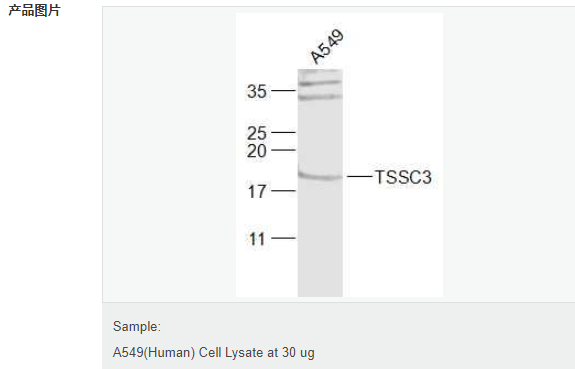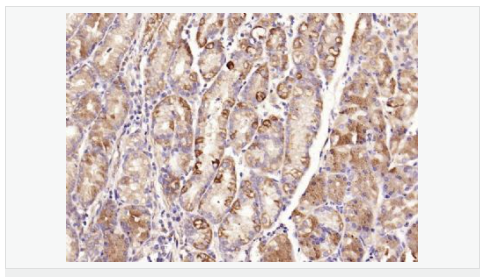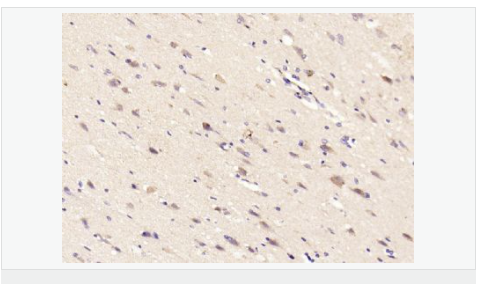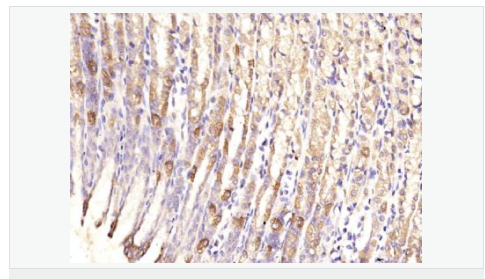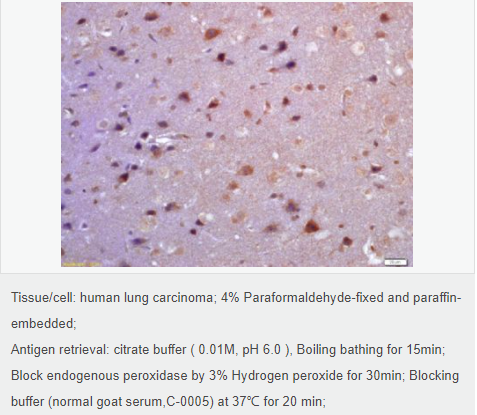
货号
产品规格
售价
备注
BN41235R-100ul
100ul
¥2360.00
交叉反应:Human,Rat(predicted:Mouse,Chicken,Pig,Cow,Horse) 推荐应用:WB,IHC-P,IHC-F,IF,ELISA
BN41235R-200ul
200ul
¥3490.00
交叉反应:Human,Rat(predicted:Mouse,Chicken,Pig,Cow,Horse) 推荐应用:WB,IHC-P,IHC-F,IF,ELISA
| 英文名称 | TSSC3 |
| 中文名称 | 肿瘤抑制转移候选基因3抗体 |
| 别 名 | Beckwith Wiedemann syndrome chromosome region 1 candidate protein C; Beckwith-Wiedemann syndrome chromosomal region 1 candidate gene C protein; BRW 1C; BRW1C; BWR 1C; BWR1C; HLDA 2; HLDA2; Imprinted in placenta and liver; Imprinted in placenta and liver protein; IPL; p17 Beckwith Wiedemann region 1C; p17 BWR1C; p17-Beckwith-Wiedemann region 1 C; p17-BWR1C; PHLA2_HUMAN; PHLDA 2; PHLDA2; Pleckstrin homology like domain family A member 2; Pleckstrin homology-like domain family A member 2; TSSC 3; Tumor suppressing STF cDNA 3 protein; Tumor suppressing subchromosomal transferable fragment candidate gene 3 protein; Tumor suppressing subchromosomal transferable fragment cDNA 3; Tumor suppressing subtransferable candidate 3; Tumor supressing STF cDNA 3; Tumor-suppressing STF cDNA 3 protein; Tumor-suppressing subchromosomal transferable fragment candidate gene 3 protein. |
| 研究领域 | 肿瘤 细胞生物 细胞周期蛋白 表观遗传学 |
| 抗体来源 | Rabbit |
| 克隆类型 | Polyclonal |
| 交叉反应 | Human, Rat, (predicted: Mouse, Chicken, Pig, Cow, Horse, ) |
| 产品应用 | WB=1:500-2000 ELISA=1:5000-10000 IHC-P=1:100-500 IHC-F=1:100-500 IF=1:100-500 (石蜡切片需做抗原修复) not yet tested in other applications. optimal dilutions/concentrations should be determined by the end user. |
| 分 子 量 | 17kDa |
| 细胞定位 | 细胞浆 细胞膜 |
| 性 状 | Liquid |
| 浓 度 | 1mg/ml |
| 免 疫 原 | KLH conjugated synthetic peptide derived from human TSSC3:31-80/152 |
| 亚 型 | IgG |
| 纯化方法 | affinity purified by Protein A |
| 储 存 液 | 0.01M TBS(pH7.4) with 1% BSA, 0.03% Proclin300 and 50% Glycerol. |
| 保存条件 | Shipped at 4℃. Store at -20 °C for one year. Avoid repeated freeze/thaw cycles. |
| PubMed | PubMed |
| 产品介绍 | Plays a role in regulating placenta growth. May act via its PH domain that competes with other PH domain-containing proteins, thereby preventing their binding to membrane lipids. Function: Plays a role in regulating placenta growth. May act via its PH domain that competes with other PH domain-containing proteins, thereby preventing their binding to membrane lipids (By similarity). Subcellular Location: Cytoplasm. Membrane. Tissue Specificity: Expressed in placenta and adult prostate gland. In placenta, it is present in all cells of the villous cytotrophoblast. The protein is absent in cells from hydatidiform moles. Hydatidiform mole is a gestation characterized by abnormal development of both fetus and trophoblast. The majority of hydatidiform moles are associated with an excess of paternal to maternal genomes and are likely to result from the abnormal expression of imprinted genes (at protein level). Expressed at low levels in adult liver and lung, and fetal liver. Expressed in adult brain and neuroblastoma, medullablastoma and glioblastoma cell lines. Similarity: Belongs to the PHLDA2 family. [SIMILARITY] Contains 1 PH domain. SWISS: Q53GA4 Gene ID: 7262 Database links: UniProtKB/Swiss-Prot: Q53GA4.2 Important Note: This product as supplied is intended for research use only, not for use in human, therapeutic or diagnostic applications. |
